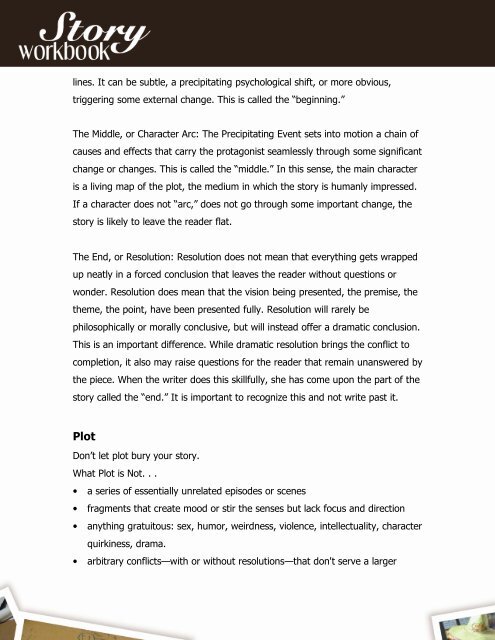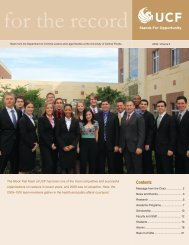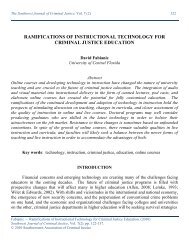SCCFP The Art of Story Telling
SCCFP The Art of Story Telling
SCCFP The Art of Story Telling
Create successful ePaper yourself
Turn your PDF publications into a flip-book with our unique Google optimized e-Paper software.
lines. It can be subtle, a precipitating psychological shift, or more obvious,<br />
triggering some external change. This is called the “beginning.”<br />
<strong>The</strong> Middle, or Character Arc: <strong>The</strong> Precipitating Event sets into motion a chain <strong>of</strong><br />
causes and effects that carry the protagonist seamlessly through some significant<br />
change or changes. This is called the “middle.” In this sense, the main character<br />
is a living map <strong>of</strong> the plot, the medium in which the story is humanly impressed.<br />
If a character does not “arc,” does not go through some important change, the<br />
story is likely to leave the reader flat.<br />
<strong>The</strong> End, or Resolution: Resolution does not mean that everything gets wrapped<br />
up neatly in a forced conclusion that leaves the reader without questions or<br />
wonder. Resolution does mean that the vision being presented, the premise, the<br />
theme, the point, have been presented fully. Resolution will rarely be<br />
philosophically or morally conclusive, but will instead <strong>of</strong>fer a dramatic conclusion.<br />
This is an important difference. While dramatic resolution brings the conflict to<br />
completion, it also may raise questions for the reader that remain unanswered by<br />
the piece. When the writer does this skillfully, she has come upon the part <strong>of</strong> the<br />
story called the “end.” It is important to recognize this and not write past it.<br />
Plot<br />
Don’t let plot bury your story.<br />
What Plot is Not. . .<br />
• a series <strong>of</strong> essentially unrelated episodes or scenes<br />
• fragments that create mood or stir the senses but lack focus and direction<br />
• anything gratuitous: sex, humor, weirdness, violence, intellectuality, character<br />
quirkiness, drama.<br />
• arbitrary conflicts—with or without resolutions—that don't serve a larger

















